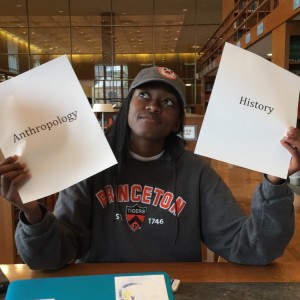For AB Princeton sophomores, April 19, 2016 was (and still is) a date engraved in our brains. It marked the deadline for declaring our concentration. By extension, it also symbolized a major transition in our academic careers. April 19 signaled the end of days, weeks and even months of uncertainty mixed with internal debates and (many) last-minute mind changes. Theoretically, the passing of April 19 should have put us sophomores at ease. No more doubt and anxiety …right?

On the contrary, I personally have experienced some uncertainty since declaring my major (Woodrow Wilson School of Public and International Affairs, also known as “Woody Woo”). Given that many of my friends have had similar feelings, I’ve decided to address two questions that my fellow not-so-anxiety-free sophomores might have post-concentration declaration.
How do I know this was the right choice for me?
This is a big one. The department you choose greatly influences the remainder of your academic experiences at Princeton and your independent work. Moreover it can (but does not necessarily) help you determine your post-graduation plans and career path. It’s no surprise that many sophomores have second thoughts about their majors.
Of course, determining whether you made the right choice is an entirely individual endeavor; but I’ll offer a few pieces of general advice. Firstly, we have all thought long and hard about which concentration to choose. These were not spur of the moment decisions. We chose our concentrations based off of years of academic experiences, introspection and discussion with advisers, parents and friends. It’s normal to think twice about a decision this big—but trust that you made an informed decision.
Also, know that you may have considerable freedom to explore topics within your major. Flexibility varies from department to department, but you will most likely be able to narrow the focus of your independent research in a way that interests you.
If you are absolutely positive that you made the wrong decision, you might be able to change your major. It depends on your completion of the necessary prerequisites and ability to fulfill future requirements. If you are genuinely worried, you should meet with representatives from both the department you declared and the one you’re considering as soon as possible—definitely before classes start in the fall. You can find more information here.
How should I approach my course of study?
Planning how to fulfill requirements for your concentration can be incredibly stressful. But, it’s also incredibly necessary. No one wants to end up taking five classes for numerous semesters because they didn’t plan their classes wisely.
Before declaring Woody Woo, I had to fill out a form roughly outlining which courses I will take for the next two years and how I will fulfill my requirements. While this was a tedious task, I found it exceptionally useful. I realized that I don’t have very much wiggle room within my requirements for my concentration and certificates; I can only take one or two classes outside of my department and certificate programs. Not all departments require sophomores to fill out such forms, but I think they serve as a great exercise in planning your course of study. See if your department has a planning form, and, if not, try creating a spreadsheet detailing your requirements and how you will fulfill them. Not only will it help ensure that you don’t miss requirements, it can also urge you to start thinking about your independent work and how you want to specialize within your field.
Additionally, it’s a good idea to reach out to your departmental adviser any time you have a question or are considering altering your course of study. Many departments also have useful advising resources on their websites (for example, the Woody Woo advising tool and the Economics Department’s checklists), so you can generate informed questions before setting up an in-person meeting.
While many sophomores will continue to worry about their decisions, it’s important to remember that each department has support systems in place to advise us on our course of study and independent work. Every department provides a variety of resources, such as independent work guides, that help us navigate the research process. Furthermore, department representatives, undergraduate administrators, faculty, upperclassmen and graduate students all have intimate knowledge of the department to share. So, in a way, April 19 marked our transition into new communities—ones that can guide us and remind us exactly why we chose our concentrations.
—Emma Kaeser, Social Sciences Correspondent

